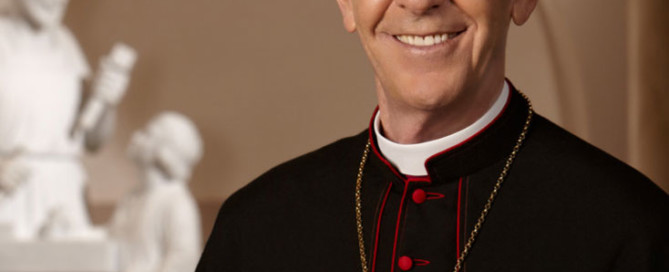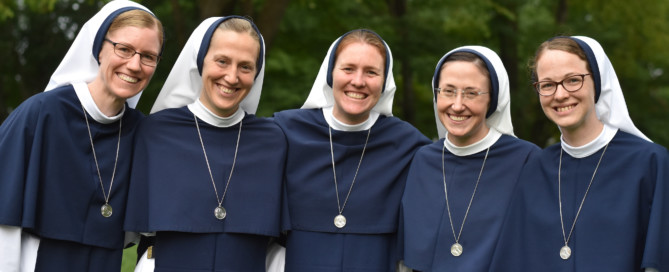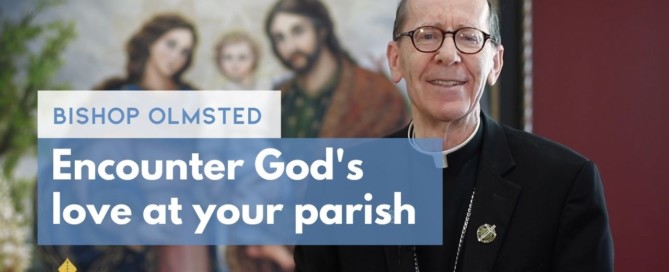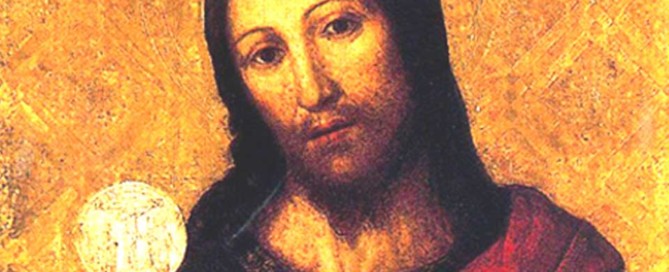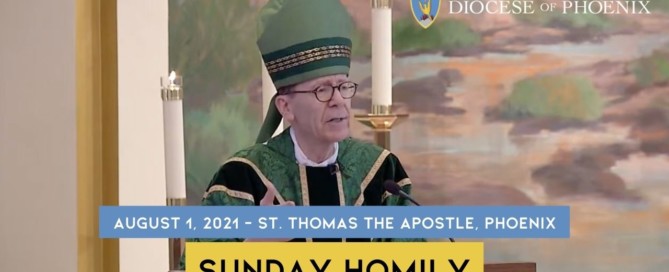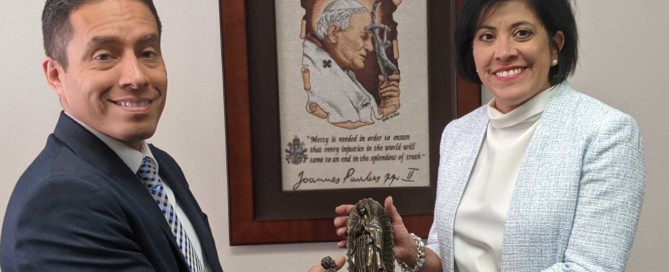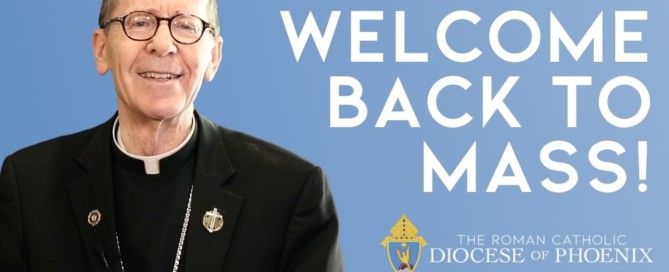Welcome to Our New Website!
Pope Francis Names Bishop Thomas J. Olmsted as Apostolic Administrator Sede Vacante of the Byzantine Eparchy of Phoenix
Pope Francis Names Bishop Thomas J. Olmsted as Apostolic Administrator Sede Vacante of the Byzantine Eparchy of Phoenix
August 23, 2021
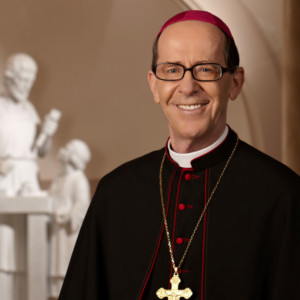
The Most Rev. Thomas J. Olmsted, Bishop of the Roman Catholic Diocese of Phoenix.
WASHINGTON — Pope Francis has accepted the resignation of Bishop John Pazak, C.Ss.R, 75, from the pastoral governance of the Holy Protection of Mary Byzantine Catholic Eparchy of Phoenix, and has appointed Bishop Thomas Olmsted of Phoenix as Apostolic Administrator sede vacante of the Eparchy. Bishop Olmsted will also retain his current Office as Bishop of the Diocese of Phoenix.
The resignation and appointment were publicized in Washington, D.C. on August 23, 2021, by Msgr. Séamus Horgan, chargé d’ affaires, a.i. of the Apostolic Nunciature in the temporary absence of Archbishop Christophe Pierre, apostolic nuncio to the United States.
Bishop Olmsted’s full statement follows:
His Holiness Pope Francis has accepted the resignation of Bishop John Pazak upon reaching the age of 75, and has appointed me as Apostolic Administrator Sede Vacante of the Eparchy of Phoenix, also known more formally as the Holy Protection of Mary Byzantine Catholic Eparchy of Phoenix.
Over the past three years, I have served as Apostolic Administrator Sede Plena of the Eparchy. With the Holy Father’s decision, I shall continue as Apostolic Administrator until a new Bishop of the Eparchy has been named. I shall continue to facilitate the task of resolving some legal matters and to support the efforts of everyone in the Eparchy to faithfully serve the mission of Christ and His Church.
There is no fixed term to my appointment; I am happy to serve in any way that will support my brothers and sisters in the Eparchy. At the same time, I retain my present office of Bishop of Phoenix.
In my own name and on behalf of the clergy and laity of the Eparchy of Phoenix, I want to express our gratitude to God for Bishop Pazak’s years of faithful service to the mission of the Church and to ask the Lord’s abundant graces upon Bishop Pazak in this time of transition.
Please join me in asking for the Holy Protection of Mary over the Eparchy of Phoenix and over the future Bishop whom we await with lively hope in Christ.
Most Reverend Thomas J. Olmsted, D.D., J.C.D.
Apostolic Administrator Sede Vacante of Holy Protection of Mary Byzantine Catholic Eparchy of Phoenix
Bishop of Phoenix
Bishop Olmsted has served as the fourth Bishop of the Diocese of Phoenix since December 20, 2003.
Prior to his arrival in Phoenix, Bishop Olmsted served as Bishop of Wichita, Kansas from 2001-2003, after being ordained Coadjutor Bishop on April 20, 1999. Before serving in Wichita, he served as the Rector and President of the Pontifical College Josephinum, a Catholic Seminary in Columbus, Ohio. Since 1974, Bishop Olmsted has been a member of the Jesus Caritas fraternity of priests. He was ordained a priest for the Diocese of Lincoln, Neb., July 2, 1973.
For 16 years, Bishop Olmsted lived in Rome, where he obtained a master’s degree in theology and a doctorate in Canon Law from the Pontifical Gregorian University (1981) and worked more than nine years as an official in the Vatican Secretariat of State from 1979 to 1988. During his time in Rome, he was also an assistant spiritual director at the Pontifical North American College.
The Byzantine Eparchy of Holy Protection of Mary embraces all Catholics of the Byzantine-Ruthenian Church in the states of California, Oregon, Washington, Idaho, Nevada, Arizona, Utah, Wyoming, Montana, Colorado, New Mexico, Alaska, and Hawaii.
The Diocese of Phoenix, Arizona comprises 43,967 square miles. It has a total population of 4,734,036 people of which 1,188,243 or 25 percent, are Catholic.
Media
Robert DeFrancesco
Director of Communications
rdefrancesco@dphx.org
(602) 354-2130
Sisters of Life Announces New Foundation in the Diocese of Phoenix
Sisters of Life Announces New Foundation in the Diocese of Phoenix
For several years, the Sisters of Life have been discerning sending religious sisters to the Diocese of Phoenix to support our work of serving women in crisis pregnancies and college outreach. On September 8, five Sisters will officially join us here in Arizona for their Phoenix Mission. They will be in residence at St. Agnes Parish in Phoenix. We are grateful to Fr. Bradley Peterson, O.Carm, for his generous welcome and assistance to the Sisters of Life in establishing their new home and mission here.
It is a joy to also announce the five Sisters of Life who have been missioned to Phoenix:
- Sr. Bethany Madonna, Superior & Mission Coordinator
- Sr. Fiat Marie
- Sr. Claudia Marie
- Sr. Magnificat Rose and
- Sr. Elizabeth Grace
Sr. Magnificat Rose and Sr. Elizabeth Grace are among six women who, on Aug. 6, professed their perpetual vows. Sr. Bethany has served as the Vocations Director for the past four years, during which the Sisters of Life have been richly blessed with many young women discerning their vocation.
Please pray for the Sisters of Life as they move from New York, and as they establish their life here and their service to pregnant and post-abortive women in need, as well as their evangelization work at Arizona State University in Tempe, in cooperation with All Saints Newman Center.
Learn more about the Sisters of Life: https://sistersoflife.org
Inquiries may be sent to:
Mrs. Pam Lambros
Mr. Mike Phelan
Encounter God’s love at your parish
Encounter God’s love at your parish
Pope Benedict XVI said that “…being Christian is not the result of an ethical choice or a lofty idea, but the encounter with an event, a person, which gives life a new horizon and a decisive direction.”
As your children grow older, they will come to experience the love of Jesus through prayer, liturgy, the sacraments, catechesis and acts of charity. This happens first within your family, the domestic church. Faith entails an encounter with Jesus, an encounter with God’s love in your parish – through various youth retreats and school experiences that deepen their Catholic faith.
I encourage you to explore what your parish has to offer as we begin this new year, whether that is through religious education, marriage enrichment, Bible study, or extracurricular activities.
Learn more: https://www.dphx.org
Eucharist: Strength, Sacrifice, Scandal
Eucharist: Strength, Sacrifice, Scandal
Following is the prepared text from Bishop Olmsted’s homily for the 19th Sunday in Ordinary Time.
“I am the living bread that came down from heaven; whoever eats this bread will live forever” (John 6:50).
In the Word of God today, for a third Sunday in a row, the Lord invites us to ponder the Eucharist, the mystery of Christ coming to us as the Bread of Life.
In the First Reading, the Prophet Elijah is fleeing from Jezebel who has ordered his death. Elijah rushes towards Horeb, the mountain of God. On the long trek through hot desert sands, feeling exhausted, physically and spiritually, Elijah prays for death, saying to God, “This is enough! Take my life.” He tosses his weary bones under a broom tree and falls asleep, hoping never to wake up. But, God’s love for Elijah is not exhausted. He sends an angel to wake him up and give him food from heaven. Elijah eats the food, drinks the water, and again collapses in sleep. But, God sends the angel a second time, wakes Elijah again, and orders him to get up and eat “else the journey will be too long.” Elijah obeys the Angel; and what he could not do by his own strength, he can now do because of the food from heaven. Elijah “got up, ate, and drank; then, strengthened by that food, he walked 40 days and 40 nights to the Mountain of God, Horeb” (1 Kgs 19:4ff).
This historic incident helps us to understand the Eucharist. Like the manna in Moses’ time, like the scroll of God’s word that Ezekiel was given to eat, like the sacrifice offered by the priest Melchizedek, and many more instances, God foreshadowed the Eucharist and prepared His people to understand the words of Jesus in today’s Gospel: “I am the living bread that came down from heaven; whoever eats this bread will live forever.”
The strength Elijah needed was not for his body but his soul. He had sunk to the depths of despair. He was certain that all his work for God was for naught, worthless. It was the darkest moment of his life; so dark that he prayed to die. But God’s mercy endures forever. The Lord gives bread from heaven to us who get tired, who want to run away. As Brother Randall told me, just before my ordination, “Thomas, the most diabolical of all temptations is discouragement.” A great obstacle to holiness is spiritual exhaustion.
Jesus says (Jn 10:10), “I came that you might have life and have it abundantly.” He gives us this life through His Body the Church, especially through the Eucharist. Still, why do we NOT feel like the Eucharist is enough? Why does our weariness continue? Why does God allow our faith to be tested? St. Paul answers (2 Cor 5:7), “We walk by faith and not by sight.” Through food from heaven and the help of an angel, Elijah found strength to walk 40 days and 40 nights to the mountain of God. The Lord restored Elijah’s reason for living. He refreshed his strength; in a way and at the time that God knew best. The gift of Jesus in the Eucharist does the same for you and me. At times, we too are overwhelmed, exhausted, worn down by temptation, tired in body and soul. These are the moments when it seems like the Lord is not listening. But He is.
The Eucharist is “viaticum”, food for our journey to heaven. Here on earth, we have no lasting city. We are pilgrims and strangers. Our trust is not in man. It is in “Christ crucified, a stumbling block to the Jews and foolishness to Gentiles, but to those who are called, Jews and Greeks alike, Christ the power of God and the wisdom of God. For the foolishness of God is wiser than human wisdom, and the weakness of God is stronger than human strength” (1 Cor 1:23-25).
There is no greater power for love than Jesus. He is stronger than sin, more powerful than death. He is precisely what we need when, like Elijah, we think we cannot go on. The Eucharist strengthens the weary; it gives us the desire and the ability to love, to complete our work on earth.
Our Second Reading today reminds us that the Eucharist is born from sacrifice; it renews sacrifice and equips us for sacrifice. St. Paul writes to the Ephesians (Eph 5:2), “Christ loved us and handed himself over for us as a sacrificial offering to God.” The Mass makes present this “sacrificial offering to God.” At Mass and on the Cross, there is one and the same victim, one and the same priest, Jesus, who offers the gift of Himself to the Father through the ministry of a priest.
At the beginning of Mass and again at the end, the priest kisses the altar, because there, each day, Christ the Perfect Victim and the Great High Priest offers Himself in sacrifice to the Father for the Redemption of the world. This is the great mystery of our faith. The Catechism of the Catholic Church explains it as follows (#1323, #1085):
“At the Last Supper, on the night He was betrayed, our Savior instituted the Eucharistic sacrifice of His Body and Blood. This He did in order to perpetuate the sacrifice of the Cross throughout the ages until He should come again…
His Paschal event is a real event that occurred in our history, but it is unique; all other historical events happen once, and then they pass away, swallowed up in the past. The Paschal mystery of Christ, by contrast, cannot remain only in the past, because by His death He destroyed death, and all that Christ is… participates in the divine eternity, and so transcends all times while being made present in them.”
At the Eucharist, through Jesus, with Him, and in Him, in the unity of the Holy Spirit, all glory and honor is given to the Father. At Mass, we are one with Jesus as He eternally offers the best possible gift that can be made to God, the holy sacrifice of His life. In this holy sacrifice of Jesus is found reparation for our sins and the sins of the world. In this mystery of love, we bring before the Father our needs and the needs of the world. There is no other sacrifice worthy of being offered to God except the one that Christ offered to His Father on Calvary and continues to offer in eternity. And in His mercy, Jesus makes us one with Him. No wonder we look upon the Eucharist as such a wondrous mystery, as a blessing beyond all other blessings. The Bread of Life and Cup of eternal Salvation make it possible for us to do what St. Paul urges the Romans (12:1):
“Present your bodies as a living sacrifice, holy and acceptable to God… your spiritual worship.”
One final point from today’s Gospel — we are told (John 6:41): “The Jews murmured about Jesus because He said, ‘I am the bread that came down from heaven’.” Those who had the privilege of being with Jesus as He multiplied the loaves and fish, those who for the first time, heard Him teach about this greatest of mysteries, were scandalized by the Eucharist. They thought they had “good reasons” to walk away from Jesus. We do well to remember this fact. In every age, certainly in our own, people find reasons to stop worshipping God: controversies and scandals occur, and Satan uses these moments to lead people away from the most profound way we can be one with Christ. We need, as Jesus urges, to be (Mt 10:16) “wise as serpents and as innocent as doves.” We need to ask ourselves: am I scandalized by something that is really scandalous? Or am I caught up in unhelpful criticism, losing sight of the amazing mystery that occurs each day at Mass?
Human weaknesses and sins always abound – should we be scandalized by them, or should we heed the advice found in the Letter to the Hebrews (12:2)? “Let us keep our eyes fixed on Jesus, who inspires and perfects our faith.” Indeed, what a blessing it is, through thick and thin, in good times and in bad, day after day, to give glory and honor to God, and with a grateful heart and strong faith, to eat the Body and drink the Precious Blood of Jesus, our Lord.
God gave them bread from heaven
God gave them bread from heaven
Following is the prepared text from Bishop Olmsted’s homily for the 18th Sunday in Ordinary Time.
The Mystery of the Eucharist is robustly biblical. It is deeply rooted in Sacred Scripture and the History of Salvation. In the Old Testament, God is preparing His people for the gift of Himself at the Last Supper. We see this in today’s first reading, Exodus 16, which tells how God fed His people manna on their journey to freedom in the Promised Land. Four things about the manna foreshadow and help us to understand this great gift of the Eucharist.
First, manna is miraculous bread from heaven, given by the Lord Himself. God tells Moses, “I will rain down bread from heaven for you.” Manna was not ordinary bread. It was heavenly bread given by the Lord Himself and provided anew every day. Our Responsorial Psalm today, Psalm 78, affirms this great blessing as it says, “Man ate the bread of angels.” This great mystery, foretold in the Old Testament and fulfilled by Jesus in the New, is captured in the beautiful Hymn written by St. Thomas Aquinas, “Panis Angelicus.”
Second, not only did God give them bread from heaven, but He also gave them flesh from heaven. The Lord tells Moses (Ex 16:12), “In the morning you shall be filled with bread [and] at twilight you shall eat flesh.” In the 6th chapter of John’s Gospel, Jesus explains that the flesh from heaven He will give is the gift of Himself in the Eucharist. Listen again to Jesus’ words in today’s Gospel passage, “…unless you eat the flesh of the Son of Man and drink His blood, you do not have life within you. Whoever eats my flesh and drinks my blood has eternal life, and I will raise Him on the last day. For my flesh is true food and my blood is true drink.”
Third, in addition to eating the miraculous bread and flesh from heaven, the Israelites also preserved it in a Tabernacle. The Tabernacle was a portable Temple to hold the Bread of Angels, i.e., manna. They learned by this practice that the manna was not only miraculous bread to eat but also something so holy that it was stored in the Holy of Holies, along with the tablets of the Ten Commandments, to be given due honor and worship.
Fourth, the manna had a distinctive flavor. In Exodus 16:31, we are told that it tasted like “wafers made from honey.” In other words, it gave the people a foretaste of the Promised Land, a “land flowing with milk and honey.”
At each celebration of the Eucharist, you and I are one with the angels and saints in heaven praising God and looking forward to the life of the world to come. How fitting it is, then, during Holy Communion, to sing the words of Psalm 34 vs. 8, “Taste and see the goodness of the Lord.” As we see, God’s gift of manna, the miraculous bread from heaven, still helps us today to understand and to stand in awe and wonder at the gift of the Eucharist.
Let us briefly turn our attention, now, to today’s Gospel passage, taken from the longest chapter in the New Testament, John 6. All of chapter 6 is focused on the mystery of the Eucharist, the Bread of Life. Last Sunday, today and the next three Sundays, the Gospel passage is taken from the 71 verses of this 6th chapter of John.
In today’s passage, John 6:24-35, Jesus begins to explain how God’s prophetic actions through Moses and the manna are now beginning to be fulfilled.
The crowd says to Jesus, “What sign can you do, that we may see and believe in you? …Our ancestors ate manna in the desert, as it is written: He gave them bread from heaven to eat.’” Prompted by this question from the crowd, Jesus begins His discourse on the Bread of Life, hoping to draw their attention beyond the prophetic acts and words of the past to what is happening at that moment. Jesus says, “…it was not Moses who gave the bread from heaven; my Father gives you the true bread from heaven. For the bread of God is that which comes down from heaven and gives life to the world.” Jesus here is connecting the dots between the bread come down from heaven and Himself, who came down from heaven to bring life to the world. Then, Jesus lifts the conversation to a whole new level as He says to them, “I am the bread of life.” With these words, Jesus begins to speak plainly of the wondrous mystery of His own Person.
Jesus presents Himself as the bread of life, that is as the Father’s Beloved Son who gives sustenance and life to all who believe in Him. This gift of Himself is so extraordinary, so divine yet human, that Jesus makes the claim, “Whoever comes to me will never hunger, and whoever believes in me will never thirst.”
The Eucharist is so “great a mystery of faith,” we can only begin to understand it by faith and can approach it only through humility and love, “down in adoration falling.” Even the greatest theologian, or the holiest saint can honestly say of their best effort to explain the Eucharist, “But what is this?” “Manna?” Jesus in the Eucharist is a mystery beyond words. He is a many-splendored reality of merciful love.
That is why millions of us celebrate Mass every day, and why many spend an hour in adoration before the Blessed Sacrament, each week or even daily. Nothing so expands our soul and inspires our heart with awe and amazement as spending time with Jesus in the Eucharist, listening to His words and receiving the gift of Himself. At this Holy Mass, some of you joining us on television, radio or the INTERNET may have questions about the Eucharist or other questions troubling your soul or weighing down your heart. Some of you may be going through transitions, which arouse anxieties and fears. Do not hesitate to bring these with trust to Jesus in the Eucharist. Ask Him, “What do you want of me, O Lord?” And like a child, tell Him, “I adore you, I love you, Do with me what you will.” In and with Christ, the Bread of life, taste and see the goodness of the Lord.
Mother, wife, leader: Chavira’s personal and professional life reflect her ‘witness of Christ’
Mother, wife, leader: Chavira’s personal and professional life reflect her ‘witness of Christ’
From Tony Gutiérrez with The Catholic Sun
Dr. Maria Chavira, Chancellor for the Diocese of Phoenix, has taken on multiple leadership roles in her life. Her accomplishments were most recently recognized by the Tepeyac Leadership, Inc. honoring her with its “St. Juan Diego Leadership for the World” award in June. But she considers her primary role as a wife and mother.
“Out of all of those roles that I play, the most important one has been my role as a wife and a mother. It’s in those roles that has prepared me most,” Chavira said in an interview with The Catholic Sun. “My role as a mom is to gather all my children and help them understand the importance of their faith — along with my husband — and work with them, listen to what it is that they need and to help meet those needs.”
Connecting her vocation to her leadership role with the Diocese of Phoenix, she added: “The Church is very unique and diverse. What you try to do is you try to listen to what the needs are that each of the people of God are bringing, and always to have a listening ear and heart for what it is that they’re going through and try to move them along their faith journey.”

